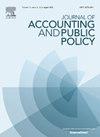Partner-Level internal control opinion shopping and its economic consequences: Evidence from “SOX 404” in an emerging market
Abstract
This study examines whether firms engage in internal control opinion shopping (ICOS) at audit partner level and its economic consequences. Based on the Chinese setting where the identities of audit partners are publicly disclosed and the requirements for internal control reporting are akin to SOX 404, we do find that firms successfully engage in ICOS at partner level. Furthermore, partner-level ICOS is associated with lower earnings quality and more tunneling activities. However, it seems that investors are not able to perceive the ICOS behavior, as evidenced by the indistinguishable market reactions to earnings announcements between ICOS firms and their counterparts. Moreover, successful partner-level ICOS firms do not remedy their internal control weaknesses in a timely manner and are more likely to receive sanctions from regulators. Further analyses suggest that firms engaged in partner-level ICOS are more likely to be charged with higher audit fees and firms whose CEOs are about to retire in the near future are more likely to conduct ICOS. This study fills the gap in the literature by investigating the outcomes of and market reactions to opinion shopping in the context of internal controls.

 求助内容:
求助内容: 应助结果提醒方式:
应助结果提醒方式:


